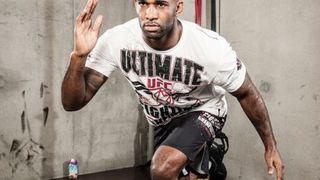Jimi Manuwa on the UFC and why he never gets bored training
Lightweight fighter Jimi Manuwa tells MF his training secrets and why he's not like other fighters

When the Ultimate Fighting Championships come calling, most mixed martial arts fighters can’t answer the phone fast enough – it’s a once-in-a-lifetime shot at hitting the big leagues, making serious money and competing at the highest level possible.
Jimi Manuwa is not like other fighters. When the US-born Brit first got an offer from the world’s biggest MMA organisation, he turned it down, knowing he needed more experience in smaller shows to make the most of his big shot.
The unorthodox move paid off. When he finally signed with the UFC in July 2012, he hit the ground running with an impressive TKO stoppage of tough contender Kyle Kingsbury, and followed up this February by dominating Cyrille Diabaté until the veteran striker was forced to retire between rounds. And it isn’t just at the negotiating table that Manuwa makes smart decisions.
After feeling the pace in his bout with Kingsbury, he enlisted expert trainer Richard Tidmarsh to revamp his training, mimicking the demands of a fight by pushing himself through several tough ‘rounds’ in every session. MF dropped in to see how the ‘Poster Boy’ prepares.
Fighting in the UFC is a big step up – how did you find the experience?
The build-up, the media obligations, the weigh-ins and the walkout are all different from the other shows – everything’s on a bigger scale. But stepping into the cage isn’t all that different. I got tired in my first fight, but that’s because I was pushing the pace for both rounds, really trying to finish the guy. I learned a lot from my first fight in the UFC – I learned to be a lot more patient.
How have you changed your training to make the leap?
Get the Coach Newsletter
Sign up for workout ideas, training advice, reviews of the latest gear and more.
Rich brings different dynamics to my training. I’ve always had good strength coaches, but we’re doing more varied things in terms of conditioning and flexibility. It’s important to mix things up.
Your workout’s pretty brutal. Do you ever get sick of it?
I never get bored in training. There are too many things to learn, especially in wrestling and jiu jitsu. I’m always learning new stuff, trying new stuff. I don’t really hate any aspect of training. What I like most is sparring – I’ll spar all day long. Getting fit is the hardest thing. Having your coaches push you, that’s tough. I like running, though.
You’ve done some training in the US. Is it much different over there?
The big difference is in the level of training partners. I was training with guys who were top ten in the world. The UK traditionally hasn’t had great wrestling, but it’s catching up.
How much training do you do in a typical week?
Six days a week. I don’t really count the hours, I count the sessions. I might do a run, some conditioning, some wrestling and then some pads. It depends how far out from the fight I am. If I’m tired I might take a day off. I play it by ear.
How do you find the notoriously difficult weight cut?
In my last weight cut I didn’t even use a sauna, I just cut the weight naturally. People talk about me dropping down to middleweight, but I think I’d lose strength. I think light heavyweight is best for me. I’ve got a nutritionist, but he just gives me guidelines really.
Do you have a plan to rise to the very top of the division?
I’m in the toughest division in the UFC, so every fight’s going to be a hard fight. The plan is to keep destroying opponents and then whatever comes, comes. I just want to be the best in the world.
Coach is a health and fitness title. This byline is used for posting sponsored content, book extracts and the like. It is also used as a placeholder for articles published a long time ago when the original author is unclear. You can find out more about this publication and find the contact details of the editorial team on the About Us page.

